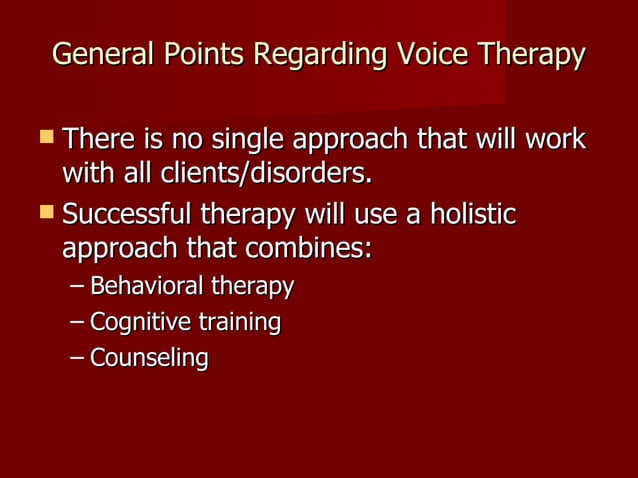Patient education is a basic side of ENT medicine management. Educational assets can include details about the nature of their condition, the function of specific medications, and sensible suggestions for managing symptoms.
 This modern channel of communication is not only handy; it enhances the general *patient experience*, making individuals really feel valued and heard in their healthcare journe With the rise of telehealth, communication between ent voice Therapy specialists and their patients has improved significantly. This open line of communication fosters a extra collaborative relationship between patients and providers. Through secure messaging systems, patients can ask questions, share updates on their situation, and search recommendation much more easily than earlier than. Instead of ready for the next appointment, sufferers can receive quick professional insights about their *treatments or symptoms*, leading to a better understanding of their well being situations.
This modern channel of communication is not only handy; it enhances the general *patient experience*, making individuals really feel valued and heard in their healthcare journe With the rise of telehealth, communication between ent voice Therapy specialists and their patients has improved significantly. This open line of communication fosters a extra collaborative relationship between patients and providers. Through secure messaging systems, patients can ask questions, share updates on their situation, and search recommendation much more easily than earlier than. Instead of ready for the next appointment, sufferers can receive quick professional insights about their *treatments or symptoms*, leading to a better understanding of their well being situations.These way of life modifications not solely support the therapeutic effects of medicines but additionally contribute to a holistic approach to well being, selling sustained improvement in ENT circumstances. The Role of Lifestyle Changes in Medication Efficacy
In addition to pharmacological treatments, way of life adjustments can considerably impression the effectiveness of ENT medications. Reducing publicity to allergens—like dust, pet dander, and pollen—can additionally complement allergy medicines, improving total symptom control. For instance, staying well-hydrated can improve the efficacy of OTC decongestants and improve sinus drainage. Smoking cessation is very important in managing conditions like chronic sinusitis and ear infections.
Embracing these technological advancements can significantly improve the general management of ENT medicines. Furthermore, digital health data can help make sure that all healthcare providers concerned are informed of a patient’s treatment routine, lowering the danger of interactions or oversights. Telehealth companies also supply convenient access to healthcare suppliers, making it simple to ask questions or handle issues without having an in-person visit. Utilizing Technology for Medication Management
Technology plays an more and more important role in efficient medicine administration for ENT disorders. Patients can benefit from utilizing medicine reminder apps, which send alerts for doses or refills, minimizing the chances of missed medicines.
Management methods for tinnitus usually concentrate on sound therapy, cognitive behavioral remedy, or medication, emphasizing the need for individualized care. Many patients report that this situation developed or worsened following their COVID-19 infection. Tinnitus can differ in intensity and might result in sleep disturbances, difficulty concentrating, and emotional distress. While the precise correlation between **ENT lengthy COVID symptoms** and tinnitus remains to be being studied, it is believed that the same inflammatory processes affecting the auditory pathways may be concerned. Tinnitus: An Invisible Burden
Another lesser-known but increasingly cited symptom is **tinnitus**, or ringing in the ears.
Telehealth has dramatically improved accessibility for ENT voice therapy patients, particularly those residing in rural or underserved areas. This newfound accessibility ensures that people can obtain timely evaluations for situations like *allergies, sinus points,* and *ear infections*, eliminating the barriers that previously hindered sufferers from seeking essential medical recommendation. Telehealth not solely breaks geographical boundaries but additionally ensures that patients can maintain common check-ups without the hassle of commutin Previously, patients had to journey important distances to seek the advice of with specialists, typically resulting in delayed diagnoses and therapy. Now, with only a smartphone or laptop, sufferers can engage in virtual consultations, drastically decreasing journey time and associated costs.
On the opposite hand, antibiotics should only be used when there’s a clear bacterial infection, as misuse can result in antibiotic resistance. For occasion, antihistamines can help mitigate signs of allergic reactions, making them a go-to for circumstances like allergic rhinitis. It's important for patients to grasp the purpose of each medication. Each medicine serves a novel function, and knowing the distinctions can considerably improve therapy adherence and effectiveness. These include antihistamines for allergic reactions, decongestants for nasal congestion, and antibiotics for bacterial infections. Understanding Common ENT Medications
In the realm of Ear, Nose, and Throat (ENT) problems, quite lots of medications are regularly used to deal with conditions effectively.








